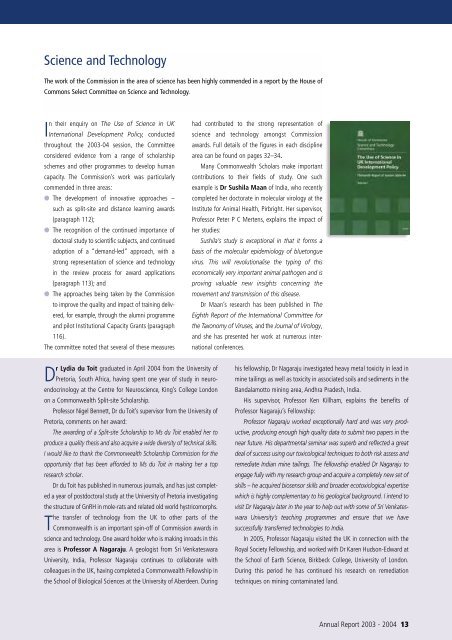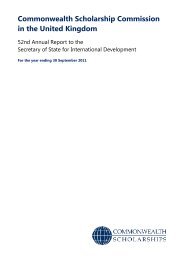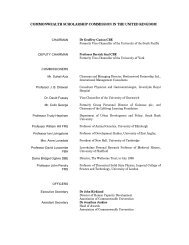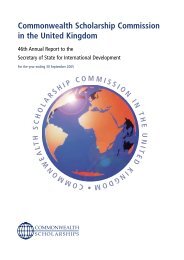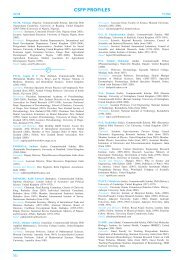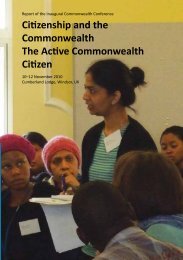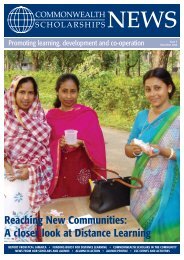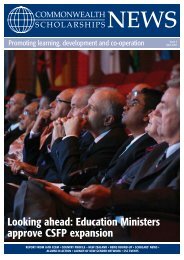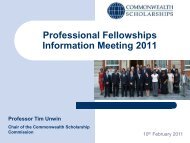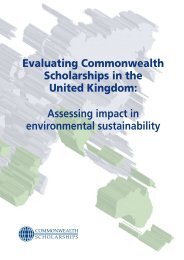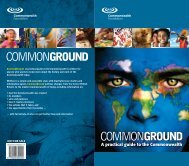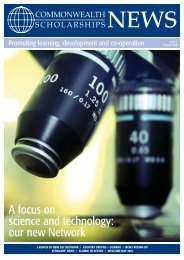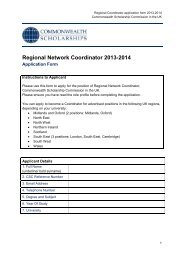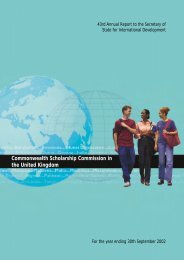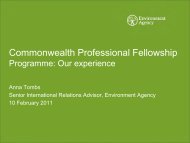45th Annual Report (2003-2004) - Commonwealth Scholarship ...
45th Annual Report (2003-2004) - Commonwealth Scholarship ...
45th Annual Report (2003-2004) - Commonwealth Scholarship ...
- No tags were found...
You also want an ePaper? Increase the reach of your titles
YUMPU automatically turns print PDFs into web optimized ePapers that Google loves.
Science and TechnologyThe work of the Commission in the area of science has been highly commended in a report by the House ofCommons Select Committee on Science and Technology.In their enquiry on The Use of Science in UKInternational Development Policy, conductedthroughout the <strong>2003</strong>-04 session, the Committeeconsidered evidence from a range of scholarshipschemes and other programmes to develop humancapacity. The Commission’s work was particularlycommended in three areas:● The development of innovative approaches –such as split-site and distance learning awards(paragraph 112);● The recognition of the continued importance ofdoctoral study to scientific subjects, and continuedadoption of a “demand-led” approach, with astrong representation of science and technologyin the review process for award applications(paragraph 113); and● The approaches being taken by the Commissionto improve the quality and impact of training delivered,for example, through the alumni programmeand pilot Institutional Capacity Grants (paragraph116).The committee noted that several of these measureshad contributed to the strong representation ofscience and technology amongst Commissionawards. Full details of the figures in each disciplinearea can be found on pages 32–34.Many <strong>Commonwealth</strong> Scholars make importantcontributions to their fields of study. One suchexample is Dr Sushila Maan of India, who recentlycompleted her doctorate in molecular virology at theInstitute for Animal Health, Pirbright. Her supervisor,Professor Peter P C Mertens, explains the impact ofher studies:Sushila’s study is exceptional in that it forms abasis of the molecular epidemiology of bluetonguevirus. This will revolutionalise the typing of thiseconomically very important animal pathogen and isproving valuable new insights concerning themovement and transmission of this disease.Dr Maan’s research has been published in TheEighth <strong>Report</strong> of the International Committee forthe Taxonomy of Viruses, and the Journal of Virology,and she has presented her work at numerous internationalconferences.Dr Lydia du Toit graduated in April <strong>2004</strong> from the University ofPretoria, South Africa, having spent one year of study in neuroendocrinologyat the Centre for Neuroscience, King’s College Londonon a <strong>Commonwealth</strong> Split-site <strong>Scholarship</strong>.Professor Nigel Bennett, Dr du Toit’s supervisor from the University ofPretoria, comments on her award:The awarding of a Split-site <strong>Scholarship</strong> to Ms du Toit enabled her toproduce a quality thesis and also acquire a wide diversity of technical skills.I would like to thank the <strong>Commonwealth</strong> <strong>Scholarship</strong> Commission for theopportunity that has been afforded to Ms du Toit in making her a topresearch scholar.Dr du Toit has published in numerous journals, and has just completeda year of postdoctoral study at the University of Pretoria investigatingthe structure of GnRH in mole-rats and related old world hystricomorphs.The transfer of technology from the UK to other parts of the<strong>Commonwealth</strong> is an important spin-off of Commission awards inscience and technology. One award holder who is making inroads in thisarea is Professor A Nagaraju. A geologist from Sri VenkateswaraUniversity, India, Professor Nagaraju continues to collaborate withcolleagues in the UK, having completed a <strong>Commonwealth</strong> Fellowship inthe School of Biological Sciences at the University of Aberdeen. Duringhis fellowship, Dr Nagaraju investigated heavy metal toxicity in lead inmine tailings as well as toxicity in associated soils and sediments in theBandalamotto mining area, Andhra Pradesh, India.His supervisor, Professor Ken Killham, explains the benefits ofProfessor Nagaraju’s Fellowship:Professor Nagaraju worked exceptionally hard and was very productive,producing enough high quality data to submit two papers in thenear future. His departmental seminar was superb and reflected a greatdeal of success using our toxicological techniques to both risk assess andremediate Indian mine tailings. The fellowship enabled Dr Nagaraju toengage fully with my research group and acquire a completely new set ofskills – he acquired biosensor skills and broader ecotoxiclogical expertisewhich is highly complementary to his geological background. I intend tovisit Dr Nagaraju later in the year to help out with some of Sri VenkateswaraUniversity’s teaching programmes and ensure that we havesuccessfully transferred technologies to India.In 2005, Professor Nagaraju visited the UK in connection with theRoyal Society Fellowship, and worked with Dr Karen Hudson-Edward atthe School of Earth Science, Birkbeck College, University of London.During this period he has continued his research on remediationtechniques on mining contaminated land.<strong>Annual</strong> <strong>Report</strong> <strong>2003</strong> - <strong>2004</strong> 13


